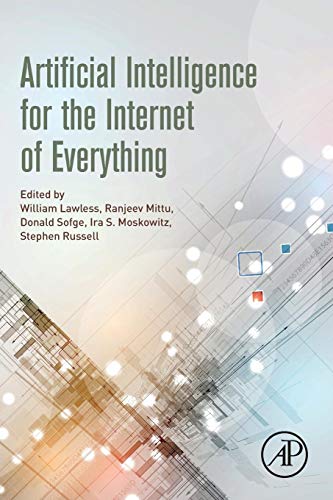

Most ebook files are in PDF format, so you can easily read them using various software such as Foxit Reader or directly on the Google Chrome browser.
Some ebook files are released by publishers in other formats such as .awz, .mobi, .epub, .fb2, etc. You may need to install specific software to read these formats on mobile/PC, such as Calibre.
Please read the tutorial at this link. https://ebooknice.com/page/post?id=faq
We offer FREE conversion to the popular formats you request; however, this may take some time. Therefore, right after payment, please email us, and we will try to provide the service as quickly as possible.
For some exceptional file formats or broken links (if any), please refrain from opening any disputes. Instead, email us first, and we will try to assist within a maximum of 6 hours.
EbookNice Team

Status:
Available4.4
8 reviewsArtificial
Intelligence for the Internet of Everything considers the foundations, metrics
and applications of IoE systems. It covers whether devices and IoE systems
should speak only to each other, to humans or to both. Further, the book
explores how IoE systems affect targeted audiences (researchers, machines,
robots, users) and society, as well as future ecosystems. It examines the
meaning, value and effect that IoT has had and may have on ordinary life, in
business, on the battlefield, and with the rise of intelligent and autonomous
systems. Based on an artificial intelligence (AI) perspective, this book
addresses how IoE affects sensing, perception, cognition and behavior.
Each
chapter addresses practical, measurement, theoretical and research questions
about how these “things” may affect individuals, teams, society or each other.
Of particular focus is what may happen when these “things” begin to reason,
communicate and act autonomously on their own, whether independently or
interdependently with other “things”.
·
Considers
the foundations, metrics and applications of IoE systems
·
Debates
whether IoE systems should speak to humans and each other
·
Explores
how IoE systems affect targeted audiences and society
·
Discusses
theoretical IoT ecosystem models
Back Cover Review
The
"Internet of Things" (IoT) refers to networks of physical devices (cars, homes,
appliances) embedded within electronic sensors, actuators, and data bases that
integrate these physical devices into a large system to allow them all to
interconnect and exchange data. Expanding IoT into specific disciplines
(medical, educational, etc.) argued for a more general term. This edited
volume, titled Artificial Intelligence (AI) for the Internet of Everything (IoE), examines
the meaning, value, and effect that IoT has had and may have on ordinary life,
in the business and industrial world, on the battlefield, and with the rise of
intelligent and autonomous systems. Based on an AI perspective, this book addresses how IoE affects sensing, perception, cognition
and behavior, as well as the causal relations occurring among users and
devices. Each chapter addresses practical, measurement, theoretical and
research questions about how these "things" may affect individuals, teams,
society, or each other. Of particular focus is what may happen when these
"things" begin to reason, communicate and act autonomously on their own,
whether independently or interdependently with other “things" autonomously.
This book
considers the foundations, metrics, and applications of IoE systems. In this
book, the authors debate whether devices and IoE systems should speak only to
each other, to humans or to both. Further, this book explores how IoE systems
affect targeted audiences (researchers, machines, robots, users) and society,
as well as future ecosystems.